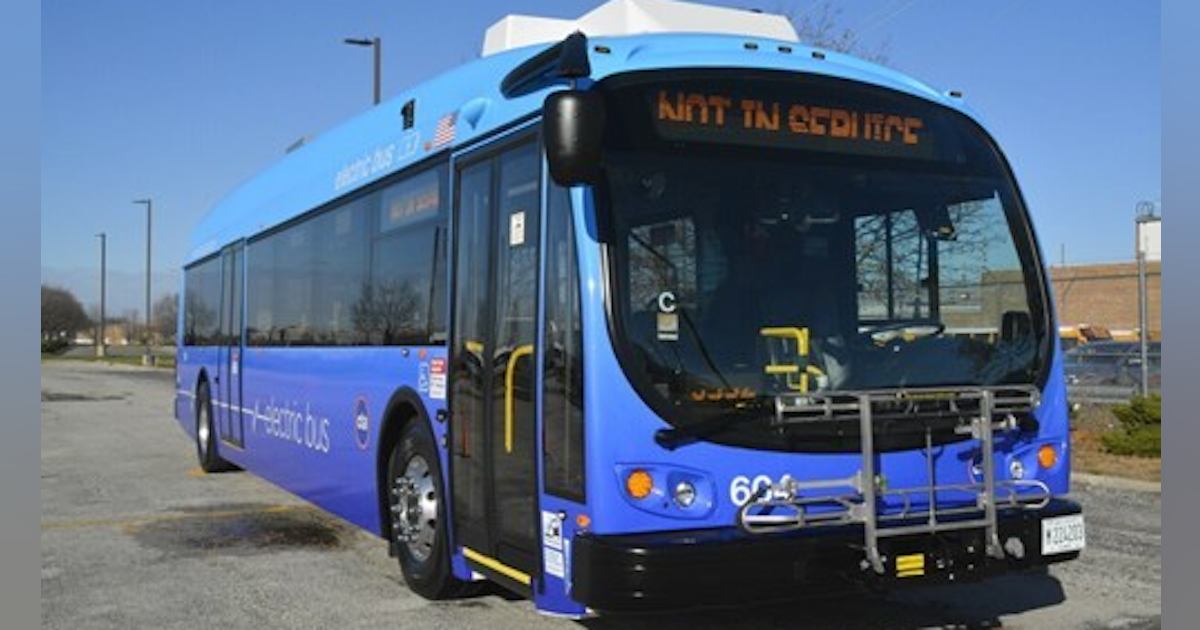
Details of a multi-year analysis were released for the full electrification of the Chicago Transit Authority's (CTA) bus fleet.
The study will serve as the first-ever roadmap for full-electrification of CTA’s bus fleet, facilities and supporting infrastructure by the year 2040.
“For nearly a decade, the CTA has been at the forefront of the shift to electric bus technology. As proud as I am of the progress we’ve made, we still have a long way to go,” said CTA President Dorval R. Carter, Jr. “The unveiling of the ‘Charging Forward’ planning study helps set the course for our agency’s next destination—full-electrification by 2040— all while ensuring that equity, the environment and the communities we serve are at the forefront of this next big endeavor.”
The agency notes electrifying the CTA bus fleet is a complex and challenging undertaking, which includes more than just replacing its current fleet of more then 1,800 buses. To support and maintain an all-electric bus fleet of this size, other vital upgrades and capital investments must be made to facilities and other supporting infrastructure, including charging equipment.
CTA’s existing bus fleet is housed at seven bus garages across the service region and serviced at a heavy maintenance facility on Chicago’s Far South Side—all of which will need to be substantially upgraded and retrofitted with charging infrastructure required to operate electric buses. CTA explains this is no small undertaking and requires the careful coordination of many interrelated investments and requires consistent state and federal funding support to achieve an ambitious target.
"We’re excited to see one of our regional partners set a bold vision for cleaner air and a more resilient future in northeastern Illinois,” said Erin Aleman, executive director of the Chicago Metropolitan Agency for Planning. “The CTA has been a national leader in deploying electric vehicle technology and plans to prioritize efforts in historically disinvested communities support our regional goals. This is a critical undertaking toward a transportation system that serves everyone better.”
"We applaud CTA for being intentional about investing in environmentally beneficial technology that will make Chicago’s air healthier and improve the service experience for its riders," added Joyce Foundation Environment Program Director Ed Miller. “We are proud to have supported this research and planning effort as CTA moves toward electrifying its bus fleet, including putting the agency in a strong position to tap federal infrastructure funds to support the transition.”
The study, “Charging Forward: CTA Bus Electrification Planning Report,” summarizes the findings of key analyses and establishes a practical framework for CTA to advance towards full electrification.
In addition, the study provides strategic recommendations on various facets of the electrification effort including:
- Which technologies to invest in;
- Where to install charging infrastructure;
- How to sequence the electrification of garages and routes;
- How to ensure that the related facility upgrades are coordinated with other modernization needs to maximize cost effectiveness and overall system reliability; and
- Outlining an achievable transition timeline for meeting the agency’s 2040 conversion goal.
With the completion of this study, the CTA is now well-positioned to compete for funding, advocate for policies and drive technology advances that will be essential to implement this plan.
With the introduction of its first two all-electric buses in 2014, CTA says it became one of the first transit agencies in the country to run electric buses in revenue service, year-round and across all four seasons. Today, CTA has 11 electric buses in service, and 14 more that are being outfitted at garages in preparation for entering revenue service later in 2022. To date, CTA has also secured more than $130 million in grant funding to continue expanding its electric bus fleet and expanding its charging infrastructure.
"We are excited to see CTA take a big step today in advancing our shared goal to electrify bus fleets serving city residents," said Angela Tovar, chief sustainability officer for the city of Chicago. “CTA’s contributions toward increasing transit ridership and making equitable investments in green mobility will play a big role in meeting our Climate Action Plan 2030 goals.”
Currently, the e-buses are operating on #66 Chicago, connecting the Austin neighborhood to the near West Side and Navy Pier. CTA aims to prioritize routes serving South and West side neighborhoods historically overburdened by air quality issues for early equitable e-bus deployment and aims to electrify routes serving the 95th Red Line hub in the next few years.
"I applaud the use of equity measures to sequence the implementation. This recognizes the reality of the past two years that essential workers have continued to ride transit," said Jacky Grimshaw, vice president, Government Affairs at the Center for Neighborhood Technology. “Economically disadvantaged areas of Chicago are being prioritized and will be the earliest to benefit from positive air quality impacts. The report clearly identifies the challenges to full fleet electrification, the need for building out charging infrastructure, as well as the need for additional funding.”
CTA says this study was made possible through the generous support of The Joyce Foundation, and in collaboration with Civic Consulting Alliance.
"electric" - Google News
February 23, 2022 at 08:02PM
https://ift.tt/40syk5b
CTA unveils roadmap for conversion to an all-electric bus system by 2040 - Mass Transit Magazine
"electric" - Google News
https://ift.tt/bv0iH4R
https://ift.tt/QrnOJEC
No comments:
Post a Comment